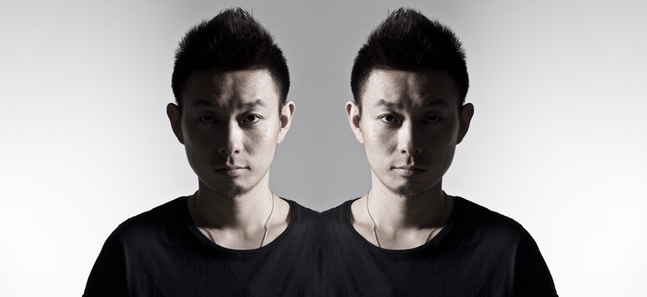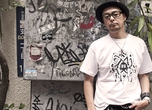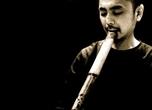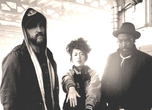DJ Kentaro: the interview
Japan’s greatest turntablist returns with a new album, ‘Contrast’

Posted: Mon Jun 25 2012
DJ Kentaro was just a 20-year-old kid from Sendai when he won the DMC World DJ Championship in 2002, the highest accolade in the ever-so-slightly geeky turntablism scene. He was the first Asian artist to win the competition, and also the first to do it with a perfect score, but that wasn't the end of Kentaro's achievements. Unlike fellow champions including Dopey, ie.MERG and Netik – names to which 'Huh?' is the only natural reaction – he's actually managed to become a bona fide star.
A decade on from his DMC triumph, you tend to see DJ Kentaro at Japan's largest clubs or on the bigger stages at music festivals: he's headlining at Ageha this weekend, and is playing on the White Stage at Fuji Rock Festival next month. Much of his appeal is down to the fact that, unlike so many of his beat-juggling brethren, he's actually fun for longer than the three-minute running time of the average turntablism routine; whether DJing or playing live, his sets put crowd-pleasing ahead of masturbatory displays of technique.
In 2005, Kentaro earned a place on the roster of Ninja Tune, the influential UK label that's provided him with a regular home ever since. This week, it releases his second solo album, Contrast, the follow-up to 2007's skittishly entertaining Enter. In keeping with the spirit – if not the sound – of his debut, the album covers a variety of bases, ranging from a scratch-off with Kid Koala and D-Styles to flirtations with grime (Foreign Beggars collaboration 'Step In'), drum 'n' bass ('North South East West') and dubstep ('Higher'). It also gives Kentaro a chance to work with one of his forebears, DJ Krush, who co-produced the atmospheric 'Kikkake'.
There's been quite a gap between your first and second albums, hasn't there?
Yeah, it was pretty long. I've done mix CDs and compilations during that time, but it's been five years since I last did an actual album. They take a really long time, you know – making one track after another. I think it'll be another five years until my third one. [Laughs.]
When you finished Enter, did you imagine you'd release your next album sooner?
Nah, I didn't think that at all. My first album took ages, too. Then I had to take it on tour, I had to do those mix CDs – the Tuff Cuts reggae one, the Ninja Tune 20th Anniversary… I was still making tracks, but stringing them together into a finished piece takes a long time. I started working on the album properly a couple of years ago, so I'm relieved that it's finally done. It's like, 'At last!'
What's the oldest track on the album?
That'd be 'Kikkake', the one with DJ Krush. It's the first one I did: Krush came around to my place and played me a few tracks. They were all really cool, but he asked me to pick the one I liked most, and then I used that as the basis for the track. It took about two years in total, just gradually working on it: I made a beat, added synthesizer, bells, percussion... I actually finished it last month. Krush listened to the final version and signed off on it. It was like we both did an equal amount: he did half of it, I did the other half.
And which track did you polish off fastest?
'Big Timer', I guess. I did that track with an artist called XLII: we holed up in a studio in Hakuba, a ski resort in Nagano, and did it in a couple of days. We were churning away for one day, then it was like, 'Wow, we can probably finish this', so we decided to have some food and hit the sack, got up the next day and carried on working. We had the basic track down after two days. I wanted to put a ragga MC on there, and was scouting around for one when XLII said he knew someone good – this guy from Chicago called MC Zulu, who did ragga vocals but had melodies in there too, just really cool stuff. So we listened to him, then sent him the track. He said he'd get it back to us quickly, and he did – it took less than a month. We turned that one around really quickly.
The album has a pretty different sound from Enter. Did you have a clear idea of the kind of album you wanted to make when you started out?
Yeah, I wasn't planning to make a purely dubstep CD… I like dubstep, I like drum 'n' bass and drumstep, but I also had the whole turntablism side – I wanted to make a track with Kid Koala, and so on. I ended up with about 50 tracks in total, then it was like, 'Ditch this, keep this, ditch this, keep this' until I had 15 or 16 left. It wasn't a case of me starting off like 'I'm going to make such-and-such an album', it was more like putting a puzzle together as I went along. The title, Contrast, came towards the end – right at the end, actually. I didn't really have a clear concept at the beginning.
What kind of music were you listening to when you were making the album?
I was listening to four-four stuff, dubstep, lounge, band music. I picked up a CD of Jack Johnson's Kokua Festival at a supermarket when I was in Hawaii recently, and I really liked that. It's this festival they do in Hawaii, with all these singer-songwriters like Jack Johnson, Ziggy Marley – it's ace. But when I was making the album, I probably wasn't listening to other tracks. I was really focussed on my work.
Well, it certainly doesn't sound like Jack Johnson – it feels much more urban than that.
Yeah. You could call it club music or dance music; it isn't just 'bass music'. I think 'dance music' just about covers it – I dunno what genre it is. [Laughs.]
I felt like there was a pretty strong UK influence, especially in the first half of the album. How do you take things like grime and dubstep and make them your own?
One example is 'Kikkake': it's 70BPM, the same kind of tempo as dubstep, but I made it more interesting by adding Japanese sounds, like shamisen and bells. It ended up being pretty abstract – it feels more like collage art than straight-up dubstep. Then there was 'North South East West' with Matrix and Futurebound, where it's drum 'n' bass mixed up with scratching. That one turned out really well. Futurebound spent three days at my place when he was in Tokyo for a DJ gig at Womb, and we made it together. Matrix was in England, so we sent him the track and he did the mixdown, then I added the scratching right at the end.
It's amazing what you can do with technology these days.
It is, isn't it? You can do everything over email.
Speaking of which: when Enter came out, you said that DJing technology like Serato still wasn't up to a standard where you could use it live. Things have changed a lot since then, haven't they?
Totally. One of the big eye-openers for me was when I went on tour overseas: the first time was my European tour in 2004, and I rocked up at Narita Airport with four boxes of records. 'That'll be ¥350,000.' 'Whaaaat?' I could send them back home by courrier, so I opened all the boxes and went through all the records: 'I'll use this. I won't use that.' I sent about three boxes' worth back to my place, but I still had about a box and a half, which cost me ¥50,000. That's when I realised: damn, analogue is heavy. I got stung that time, and I had to do the tour with just one box of records. With Serato, you don't have much to lug around, which was a reason for using it. At first, I'd have vinyl and use a little bit of Serato, but then it became 50-50, and then the digital gradually took over. It went to 70-30, then got to the point where I was mostly just using Serato – I only really use vinyl for my routines.
You played at Coachella festival in the US last year, didn't you? How did that come about?
They mailed me out of the blue. Where were we, New Zealand? I was doing a festival somewhere, and during the rehearsal my brother was like, 'Woah!' 'What is it?' I asked. 'Coachella.' 'What's that? Does it taste good?' I didn't know what he was talking about. 'Oh, Coachella!' They asked first, and I was really keen to do it. Kanye West was playing, Duran Duran, Skrillex – loads of people, it was a great festival. I watched lots of shows there – even just being in the audience was fun – then I did my usual set and people were really into it. Flying Lotus and Skrillex were watching from the side of the stage, too – I didn't realise at the time, but people told me afterwards, they'd walked over from the other stages to watch. I was psyched about that. Flying Lotus and Brainfeeder are really going off in LA at the moment.
Skrillex has come in for quite a lot of criticism recently...
His sound's good – the first time I heard it, I was like, 'Who the hell is this?' – but I've got a little tired of it now. [Does a perfect imitiation of a Skrillex track.] It gets a bit too much. I'm cool with it, but I think people who aren't really into bass music can't listen to it for more than 30 minutes or so. Skrillex… he's trying hard, isn't he? I've got nothing against him, but I've slightly lost interest.
You're quite the performer when you play live. Have you always been like that?
I first started watching scratch videos on TV when I was really young – like, 13 years old, 14, 15 – and practising myself. But then I started organising daytime parties when I was a high schooler. We couldn't do them at night because everyone was underage, so I'd rent a club during the daytime, on a Sunday or something, then make a thousand tickets and sell them in bunches to other students: '50 for you, 50 for you, 50 for you…' The first party, 800 people came – it was a blast. I had this fat wad of cash, like ¥1.5 million or ¥2 million, all in ¥1,000 notes. 'Man, DJs rake it in!' I was still just in high school, right? The party went off, and then afterwards it was like, 'Right: let's go drink!' and I splurged a load of money. I was doing the pimp thing, and I gave up on battle DJing for a while, stopped practising – the parties were more fun, lots of people were coming and it looked like a good earner. But, yeah, it didn't last for long: the numbers soon started dropping off. We had loads of people at first, the money was great, but people stopped coming, the vibe changed, and everyone stopped DJing. I went back to the DJ battle videos, and was like, 'Man, this stuff is way cooler.' I got really into turntablism after that, practising like crazy and watching videos. It was fun too, of course. I started off aiming to be a club DJ, then got really into turntablism instead. I probably haven't changed my style since then.
Do you feel like the turntablism scene is too constrictive?
The scene's still small – it's not like, say, pop music or house music, or techno, which is a really big scene in Europe. I don't think bass music has really taken off in Japan yet – it's going to get bigger in the future. Turntablism's really difficult to master, and there aren't that many people doing it, but I'd like to make the scene bigger, for sure. I've got my own style now and I'm going to keep on doing it, regardless of which other scenes get big or small. There are new competitions, too, like Red Bull's Thre3Style – I think DJ battles are going to carry on.
Has turntablism become less important to you?
Nah, it's not like that at all. When I play tracks off the new album live, I'll be beat juggling, scratching, doing live remixes and stuff. I want to do something new with it.
What's going to go down at the Ageha gig? I heard you were going to be using an LED screen.
Yeah, I'm going to have LEDs, and I'll be playing on the same stage as DJ Krush. We've got sessions and collaborations lined up, with Fire Ball and Foreign Beggars – it's going to be their first trip to Japan. Then Mighty Crown are doing a dubstep set for the first time, kinda reggae-style dubstep, and there's going to be a female DJ stage, where it's all women DJs. Dubstep gets a bit macho, so I thought it'd be interesting to give the girls their own space. I want it to be like a kind of festival.
This might sound like a weird question, but did you get nervous the first time you met Krush?
We played on the same stage at [Hokkaido music festival] Rising Sun. Krush played after me, and he picked the mic up and started talking. 'I don't really talk much, but I guess I'll talk now,' he said, in this really high-pitched voice. [Laughs.] 'DJ Kentaro, respect.' I think I talked to him backstage after that. Yeah, I was totally nervous.
DJ Kentaro plays at Basscamp 2012, Ageha on June 30. 'Contrast' is release on June 27 on Beat Records / Ninja Tune
Tweets
- About Us |
- Work for Time Out |
- Send us info |
- Advertising |
- Mobile edition |
- Terms & Conditions |
- Privacy policy |
- Contact Us
Copyright © 2014 Time Out Tokyo














Add your comment